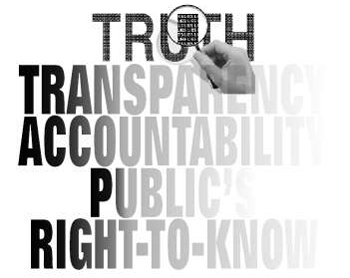Extractive Industries Fail to See Their Way through Transparency

The Extractive Industries Transparency Initiative (EITI) is an international effort to provide a robust yet flexible standard for disclosing revenues paid to governments from oil, gas, and mining companies for the people’s valuable minerals. What’s unique about EITI is the process. Rather than some international institution or government ordaining regulations, EITI establishes a collaborative process involving representatives from industry, government, and regular folks who through consensus develop the right transparency rules to fit the society.
Follow The Money
The EITI road is a two way street. Industry publishes the taxes, royalties, and other payments they make to governments. And governments disclose the money they receive. This transparency is especially critical in developing regions of the world where riches under the ground have led to enormous conflict, corruption, and strife. For wealthier nations, the transparency standards create greater certainty and reassurance for investors and stronger accountability for elected officials. Right now, the United States is vetting nominees to serve on our own EITI working group.
Too Big To Fail
One of the main topics on the table for the US EITI process involves an obscure provision of the Dodd-Frank Wall Street Reform and Consumer Protection Act. Section 1504 of the law requires US listed companies engaged in the commercial development of oil, gas and minerals to publish a detailed account of what they pay the U.S. and foreign governments on a country-by-country and project-by-project basis. After a two-year comment process, delayed in large measure to accommodate industry cost concerns, the Securities and Exchange Commission (SEC) recently issued rules for 1504’s implementation. The American Petroleum Institute, US Chamber of Commerce, and Independent Petroleum Association of America promptly sued-rehashing the same arguments from years before. Their essential concern is that disclosing payment information puts companies listed on SEC regulated exchanges at a competitive disadvantage relative to those not listed. The opposite is true.
Trading on inside information is bad for business. Markets operate most efficiently when companies make their information publicly available. Stockholders rely on accurate reporting for their investment decisions. That’s why the SEC, NASDAQ, and DJIA have rules. And more broadly, places with transparency, stable democratic institutions, courts that enforce contracts, and politicians accountable to their electorate are the safest investment locations. The truth of the matter is that, by contrast, Chinese exchanges operate very poorly precisely because corruption and secrecy increase investor risk.
They Voted For It Before They Voted Against It
Followers of the EITI process and advocacy organizations who lobbied on Dodd-Frank expected the lawsuit. Those of us who have watched the industry systematically work to dismantle basic protections designed to add a small measure of honesty to a system marred with corruption and violence were not surprised. Nor were we surprised to hear industry speaking out of both sides of its mouth. The extraction industry has actively and enthusiastically so far participated in the EITI process. I have listened as their representatives have offered counsel on issues related to its structure and scope while praising EITI’s transparency objectives. EITI works best through consensus. Congress works best through compromise. The legal system is, by design, adversarial. And credibility can only stretch so far. The extractive industries joining this lawsuit have undermined the very spirit of the EITI process. Negotiations require honest brokers and, sadly, the plaintiffs party to this suit have revealed exactly who they really are.
For more information:
- EITI Articles of Association http://eiti.org/articles
Tagged with: sec, extractive industries, eiti, dodd-frank, conflict minerals
comments powered by Disqus
Follow Earthworks